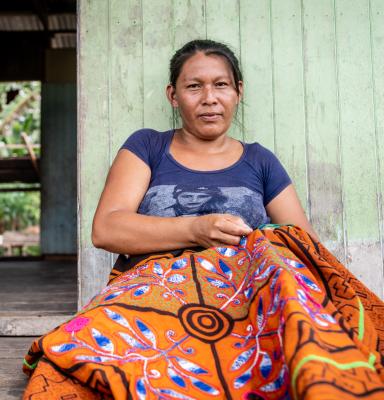
Indigenous Peoples’ Rights
As much as Indigenous Peoples have fought for recognition of their role in forest protection, they, their rights, and the resources they manage are under continuous threat of exploitation and competing land claims from governments, corporations, and other powerful actors. The historic marginalisation and oppression of Indigenous Peoples’ land rights is shown to be the cause of extensive deforestation and degradation. A recent WRI report found that in Bolivia, deforestation rates are 2.8 times lower within formally recognised indigenous held lands than outside them.
For this reason, FSC has long worked to support Indigenous Peoples and ensure their rights are upheld. The third of FSC’s Principles requires all FSC-certified forest owners and managers to identify and uphold Indigenous Peoples’ rights of ownership, use and management of land, territories and resources affected by management activities’.
FSC has adopted the United Nations concept of free, prior and informed consent for Indigenous Peoples (and, in some circumstances, local communities). This consent must be achieved before control over management activities is delegated to third parties (Criteria 3.2 and 3.3) or before the traditional knowledge of Indigenous Peoples is utilised (Criterion 3.6). For full details, see the Principles and Criteria.’
To ensure fair and equal representation of Indigenous Peoples, the Permanent Indigenous Peoples’ Committee (PIPC) was formed in 2013 as a mechanism to advise the FSC International Board on all issues related to Indigenous Peoples' involvement in FSC, including policies, standards, organisational presence, certification, and forest sector engagement.
The operative unit of the PIPC, the FSC Indigenous Foundation, was established earlier this year to further strengthen engagement and develop creative solutions to enable Indigenous Peoples to guide the sustainable management of their land through the FSC certification scheme.
What does this mean in the UK?
Adapted from UN definitions, FSC defines Indigenous Peoples as people and groups of people that can be identified or characterised as follows:
- The key characteristic or Criterion is self-identification as Indigenous Peoples at the individual level and acceptance by the community as their member;
- Historical continuity with pre-colonial and/or pre-settler societies;
- Strong link to territories and surrounding natural resources;
- Distinct social, economic or political systems;
- Distinct language, culture and beliefs;
- Form non-dominant groups of society;
- Resolve to maintain and reproduce their ancestral environments and systems as distinctive peoples and communities.
Based on this definition, Indigenous Peoples are not considered to be present in the UK. The UK government also does not recognise any Indigenous Peoples within the UK.
As a result, the UK national forest stewardship standard, more familiar to most forest managers as the UK Woodland Assurance Standard (UKWAS), does not include any indicators under Principle 3. This is a clear example of how the international Principles and Criteria must be adapted to the national context.
Have your say
We’d like to hear your opinions on FSC’s work on Indigenous Peoples at both the international level and here in the UK. Do you consider there to be Indigenous Peoples within the UK that FSC should recognise in its standards development? You can contact us here.
